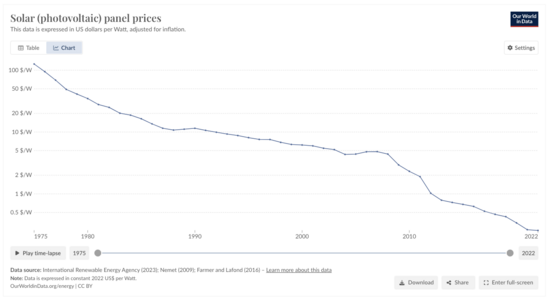Is the Power Grid Sustainable? |
October 25th, 2024 |
| electricity, solar, tech |
Solar panels keep getting cheaper. When we installed panels in 2019 they only made sense because of the combination of net metering and the relatively generous SREC II incentives. By the time we installed our second set of panels a few months ago net metering alone was enough to make it worth it.
Now, as I've said a few times, net metering is kind of absurd. The way it works here is that most of my bill is in proportion to my net consumption: if I use 100kWh but also send 100kWh back to the grid I don't pay anything for transmission or generation. I can use the grid as a giant battery, for just a $10/month grid-connection charge.
As more people run the numbers and install rooftop solar, I expect there to be increasing pressure to limit net metering, either for new installs or for everyone. But even if net metering were completely phased out it wouldn't solve the problem: as people draw less from the grid the company either needs to raise their per-kWh rates or their per-customer charges. Raise the former and installing solar becomes even more attractive; raise the latter and people start thinking about disconnecting entirely.
Solar is getting cheaper very quickly:
And so are batteries. It's going to make sense for a lot of houses to go over to solar + batteries. And if batteries are too expensive for the longest stretch of cloudy days you might have, at least here a natural gas generator compares favorably.
Wait, really? This was pretty surprising to me, but here's the sketch. My marginal cost of electricity is currently $0.33/kWh [1] vs $0.06/kWh [2] for natural gas. Now I can't charge my laptop with raw gas, which means burning the gas in a generator, and since that's well under 100% efficient I'm not actually getting a usable $0.06/kWh. While a power station could be up to 63% efficient, for a home generator maybe I'm looking at something like the 23% efficient Generac 7171, rated for 9kW on natural gas at full load. Or maybe something smaller, since this is probably in addition to batteries and only has to match the house's average consumption. This turns my $0.06kWh into $0.24/kWh, plus the cost of the generator and maintenance.
If trends continue it looks like we may be pretty close to mass defections from the power grid, which would then accelerate because the utility would need to keep raising prices to cover the same infrastructure with fewer subscribers. This could be especially bad for customers who rent, and so aren't able to install their own system, and people who don't have the savings or credit for a big up-front cost. On the other hand, it's downstream from a more efficient system overall, and maybe we can sort out the distributional impacts?
[1] Here's how that breaks down:
| Charge | Amount |
|---|---|
| Generation Service Charge | $0.1565 |
| Distribution Charge | $0.0782 |
| Transmission Charge | $0.0405 |
| Energy Efficiency Charge | $0.0311 |
| Net Meter Recovery Surcharge | $0.0162 |
| Other Charges | $0.0096 |
| Total | $0.3322 |
[2] $1.5512/therm / 28 kWh per therm = 0.0554/kWh.
Comment via: facebook, lesswrong, mastodon
